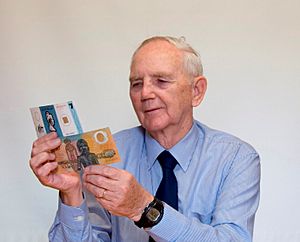David Henry Solomon facts for kids
Quick facts for kids
David Solomon
|
|
|---|---|

David Solomon holding specimen polymer banknotes
|
|
| Born | 18 November 1929 |
| Alma mater |
|
| Known for | Development of Living Radical Polymerization techniques, and polymer banknotes |
| Awards |
|
| Scientific career | |
| Fields | Polymer chemistry |
| Institutions | |
| Theses |
|
David Henry Solomon (born November 19, 1929, in Adelaide, South Australia) is a famous Australian chemist. He is known for his amazing work with polymers. Polymers are like long chains of tiny building blocks. They make up plastics and many other materials. David Solomon helped create special ways to make these polymer chains. He also played a huge part in developing the plastic polymer banknotes we use today.
Contents
Education and Early Career
David Solomon loved chemistry from a young age. He earned a diploma in chemistry in 1950. Then, he went on to get his Bachelor's and Master's degrees. He studied at the University of New South Wales. In 1959, he completed his PhD there. Later, in 1968, he received another special degree, a DSc, for his work on coating compounds. The University of Melbourne also gave him an honorary doctorate in 2005. This was a very rare honor.
David started his career early, at just 16 years old, in 1946. He joined a company called BALM, which later became Dulux Australia. This is where he first became very interested in polymers. He noticed that the way polymers behaved in the factory didn't always match the science books. This made him want to learn more.
Leading Polymer Research
In 1963, David joined CSIRO. This is Australia's main science research group. In 1970, he started the Polymer Research Group there. He later became the chief of the Division of Applied Organic Chemistry. He held this important position for 17 years.
In 1990, David moved to the University of Melbourne. He became a professor and started a new Polymer Science Group. This was his third internationally recognized group. Even after he officially retired in 1995, David kept working. He became an honorary professor. He continued to advise the Polymer Science Group. In 2015, he was given the title of professor emeritus.
Many people call David Solomon the "father of polymer research" in Australia. He created three top research groups. These groups were in industry (Dulux), in a government science organization (CSIRO), and at a university (University of Melbourne).
Key Discoveries
David Solomon is famous for several important discoveries. His work on free radical polymerization changed the field. He developed the first living radical polymerization technique. This was called Nitroxide Mediated Polymerization (NMP). He also led the team that invented the world's first polymer banknote.
Understanding Polymer Chains
David's work on free radical polymerization started with observations in factories. He saw things happening that current theories could not explain. For example, some batches of polymer materials would suddenly catch fire. This led him to make discoveries that changed how we understand radical chemistry.
His research led to Nitroxide Mediated Polymerization (NMP). This was the first way to control how polymer chains grow. His work also helped create what is now known as RAFT. This stands for Reversible addition−fragmentation chain-transfer polymerization. David Solomon's work rewrote the rules for free radical polymerization. He also co-wrote an important book about it. This book is called The Chemistry of Radical Polymerization.
Inventing Plastic Banknotes
In 1967, Australia's new $10 notes were being copied by criminals. David Solomon was asked for ideas on how to make banknotes safer. Because of his knowledge of polymers, he had a brilliant idea. He suggested printing money on plastic instead of paper. He also wanted to add special features that change appearance. These are called optically variable devices.
David led the research team and was the main inventor of the world's first polymer banknote. The first plastic $10 note was put into circulation in Australia in 1988. This was for Australia's 200th birthday celebration. He wrote a book about the history of plastic banknotes. It is called The Plastic Banknote: From Concept to Reality.
Awards and Recognition
David Solomon has received many important awards throughout his career. Here are some of them:
- 2016 Companion of the Order of Australia. This is a very high honor in Australia.
- 2011 Prime Minister's Prize for Science. He shared this award with Dr. Ezio Rizzardo.
- 2006 Victoria Prize.
- 2001 Centenary Medal.
- 1994 Clunies Ross National Science and Technology Award.
- 1990 Member of the Order of Australia.
- 1989 Ian William Wark Medal and Lecture.
Professional Groups
David Solomon's important work has been recognized by other scientists. He has been elected as a fellow to several important groups:
- Fellow of the Institution of Chemical Engineers (2007).
- Fellow of the Royal Society (2004). This is a very old and respected scientific group in the UK.
- Fellow of the Australian Academy of Technological Sciences and Engineering (1976).
- Fellow of the Australian Academy of Science (1975).
- Fellow of the Royal Australian Chemical Institute (1966).
David has always been active in these groups. Especially the Royal Australian Chemical Institute (RACI). In 2001, the RACI started the Solomon Lecture Series. This honors his contributions to chemistry. It is a series of talks given by leading international polymer researchers. It helps young scientists learn from the best in their field.

